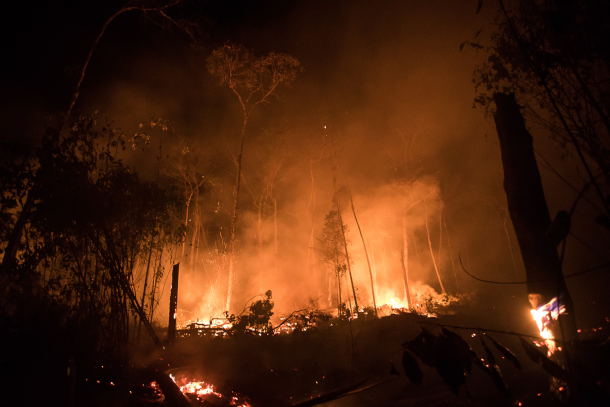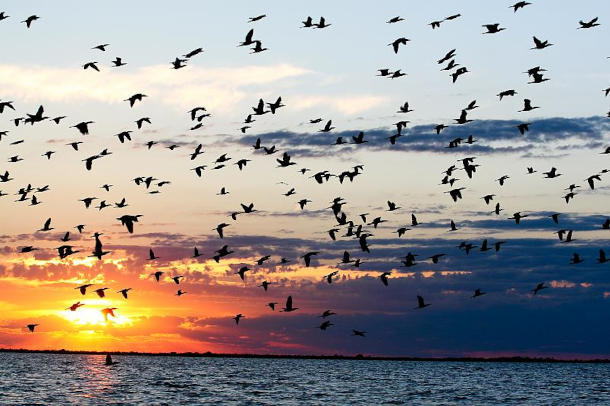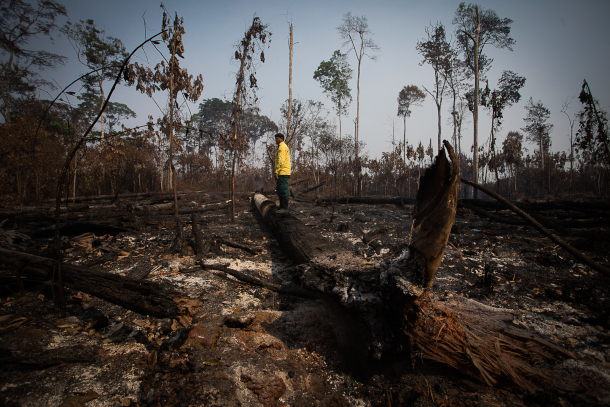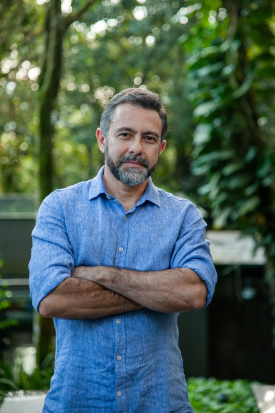Brazil On Fire
Air Date: Week of September 13, 2024

A wildfire burns in 2020 in the Brazilian state of Amazonas. (Photo: Bruno Kelly, Amazônia Real, Wikimedia Commons, CC BY 2.0)
Heat, drought, and arson are fueling an explosion of fires in Brazil’s Amazon and Pantanal region, home to wetlands and grasslands. Marcio Astrini leads the Climate Observatory, a network of civil society groups. He joins Host Aynsley O’Neill to describe the roots of the crisis and the need for the world to act boldly on climate when Brazil hosts the UN climate talks next year.
Transcript
O’NEILL: From PRX and the Jennifer and Ted Stanley Studios at the University of Massachusetts Boston, this is Living on Earth. I’m Aynsley O'Neill.
CURWOOD: And I’m Steve Curwood.
2024 is on track to be the warmest year in human history, according to the UK group Carbon Brief, which says it's likely the average global temperature increase over the preindustrial era will hit 1.57 degrees Centigrade, blowing through the Paris Climate target. Nature is already responding. The Atlantic hurricane season got off to a strong start with Beryl in July and as we prepare this broadcast the storm called Francine is raking the Gulf Coast, especially Louisiana. And in the meantime, California is getting scorched with triple the acreage of wildfires compared to 2023, with major fires also in Idaho, Oregon and Nevada.
O’NEILL: Right, Steve, and as devastating as the fires in the US west are, this is also an especially bad year for fires in Brazil. Its National Institute for Space Research monitors fires and their data show that 2024 has had the most Amazonian wildfire outbreaks since 2005. And this wildfire epidemic is also raging in the Pantanal region of Brazil, which holds both the world’s largest tropical wetland and the world’s largest flooded grassland. Compared to roughly a hundred fires last August in the Pantanal, the data show nearly 4,000 in the same month this year. Much of this ties back to how Brazil is facing its worst drought since recordkeeping began over 70 years ago, so there’s a ton of dry, flammable plant material ready to burn. And on top of that, there’s a political dimension that leads to a lack of enforcement against the perpetrators who are setting many of these fires. I spoke to Marcio Astrini, executive secretary of the Climate Observatory, which is a network of climate-focused civil society organizations. Marcio told me that even as the national government acts on slowing deforestation, it’s not enough to combat wildfires. I asked him what kind of approach the Brazilian government needs to make effective progress on stopping the burning in the Pantanal and the Amazon.

Brazil’s Pantanal region contains both the world’s largest wetland and largest flooded grassland. In August 2023 there were around 100 forest fires in the Pantanal region, but in 2024, there were over 4,000 in the same time period. (Photo: Denis Gustavo, Flickr, CC BY-NC-ND 2.0)
ASTRINI: It's a combination between federal government and local level. They must act together. When you're talking about like forest fires in places like Amazon, in Brazil, there are three main points that drive this forest fire situation. The first one is related to the climate. We have to have one climate that allows forest fires happens in those regions: dry season and high temperatures, mainly are. The second point is about having biomass. And the third one, criminals, we need someone to start the fire in the forest. It's impossible to the government to stop global warming alone, but the government can, for instance, ensure that those who are right now setting fire in the forest, are penalized, are persecuted. And it's really not happening in Brazil, because we don't have a law enough in Brazil, and even we have a lot of people who are under judgment for putting fire in the forest, but till now, no one was charged for that. So we have scenario where the impunity is the rule and the impunity is feeding the criminals.
O'NEILL: Could you elaborate on how political leadership or lack thereof has shaped Brazil's environmental policy in the past couple of years?
ASTRINI: Politicians and the government in general way, they are absolutely necessary to make the situation on climate better or worse. Let's just give an example. Look for what's happening in the Amazon. The Amazon, 90% of deforestation is illegal. Doesn't matter if the government put the enforcement or field operation against criminals and are trying to halt deforestation, if the Congress is giving amnesty to the same criminals. If the Congress is given to the same criminals messages that they will not face any punishment. So even when Congress is analyzing one bill, one project law, it provides message to those who are acting in the field of the forest. The same we can say to the petrol industry, if the petrol industry, if they are having amnesties on that, if they are having this package of benefits coming from the government, they will be incentivized to continuously doing what they are doing. During Bolsonaro term, for instance, even the single speech coming from the former president Bolsonaro was enough to feed the destruction of the forest. When the Brazilian former president said, for instance, that the criminals were right and that the legislation in Brazil were wrong in terms of protecting forests in the country, of course, they were incentivizing the criminals in the country. Bolsonaro government decreased the capacity of the environmental agencies to operate and enforce the legislation in the country. So this situation makes scenario more comfortable to the criminals, to the mafia of deforestation, to invest in forest destruction. So it's absolutely important having one government committed to the legislation and applying the legislation in a practical way.

Although Brazil’s government has worked towards reducing deforestation, it is not enough to halt these devastating fires. (Photo: Bruno Kelly, Amazônia Real, Wikimedia Commons, CC BY 2.0)
O'NEILL: I wanna zoom out a little bit and talk about Brazil's role in climate policy on a global stage. So, next year, Brazil will host COP 30, these UN climate talks. Marcio, what would you like to tell the global community about the role that Brazil can play in the fight against climate change?
ASTRINI: So, Brazil plays a very important role in the climate agenda. Brazil is very important in diplomatic issues and negotiations. Brazil is a very important country because he's one of the major emitter countries of carbon, and so Brazil contributes a lot for the current states of the climate around the world. Historically or currently, Brazil release a lot of greenhouse. And, so, to the Brazilian government or other countries, I would say, just... Climate crisis is about a social agenda. It's not about an environmentalist or diplomat trying to achieve an agreement in a closed room or something like that. It's a social issue, the poverty we raise a lot with climate crisis and the poor people around the world, exactly the people who will suffer the inequality. The climate crisis, the machine is a machine of poverty, is a machine of inequality, and we are seeing that's happening right now, and at time you are living right now. Climate crisis is no longer one prediction, no longer something that can happen in the future. It's happening right now. People are dying due climate crise, due climate change, and so there is no longer time to be waste discussing. It's just time to act right now. We have agreements enough, we have reports.

Marcio Astrini is executive secretary of the Climate Observatory. (Photo: Courtesy of Marcio Astrini)
We have scientists saying what must be done in enough quantity to take action. There is no longer excuse on that. So, to the Brazilian government, to the US government, to the China government, to the India government, the Indonesia government, the Russia government doesn't matter where you are, all the countries needed to take action right now. Doesn't work as well just one country, like if a Brazil, or if Indonesia ended deforestation, if India, anywhere, and China, doesn't address the fossil fuels issue, because we're gonna lose the forest if we don't solve fossil fuels issue around the world. So, the Brazilian government has a very important situation hosting the COP 30. There are a lot of expectations over the climate conference in Brazil, and Brazilian government must have courage to push ahead the phase out fossil fuel agenda and showing that it's possible, also adopting important actions and measures internally, leading by example, and the best way to do that is ending deforestation mainly in the Amazons.
O'NEILL: Marcio Astrini is the executive secretary of the Climate Observatory. Marcio, thank you so much for joining me today.
ASTRINI: Thank you for the invitation. It was a really pleasure. Thank you.
Links
Reuters | “Brazil’s Amazon Rainforest Fires in August Reach 14-Year High”
Living on Earth wants to hear from you!
Living on Earth
62 Calef Highway, Suite 212
Lee, NH 03861
Telephone: 617-287-4121
E-mail: comments@loe.org
Newsletter [Click here]
Donate to Living on Earth!
Living on Earth is an independent media program and relies entirely on contributions from listeners and institutions supporting public service. Please donate now to preserve an independent environmental voice.
NewsletterLiving on Earth offers a weekly delivery of the show's rundown to your mailbox. Sign up for our newsletter today!
 Sailors For The Sea: Be the change you want to sea.
Sailors For The Sea: Be the change you want to sea.
 The Grantham Foundation for the Protection of the Environment: Committed to protecting and improving the health of the global environment.
The Grantham Foundation for the Protection of the Environment: Committed to protecting and improving the health of the global environment.
 Contribute to Living on Earth and receive, as our gift to you, an archival print of one of Mark Seth Lender's extraordinary wildlife photographs. Follow the link to see Mark's current collection of photographs.
Contribute to Living on Earth and receive, as our gift to you, an archival print of one of Mark Seth Lender's extraordinary wildlife photographs. Follow the link to see Mark's current collection of photographs.
 Buy a signed copy of Mark Seth Lender's book Smeagull the Seagull & support Living on Earth
Buy a signed copy of Mark Seth Lender's book Smeagull the Seagull & support Living on Earth

